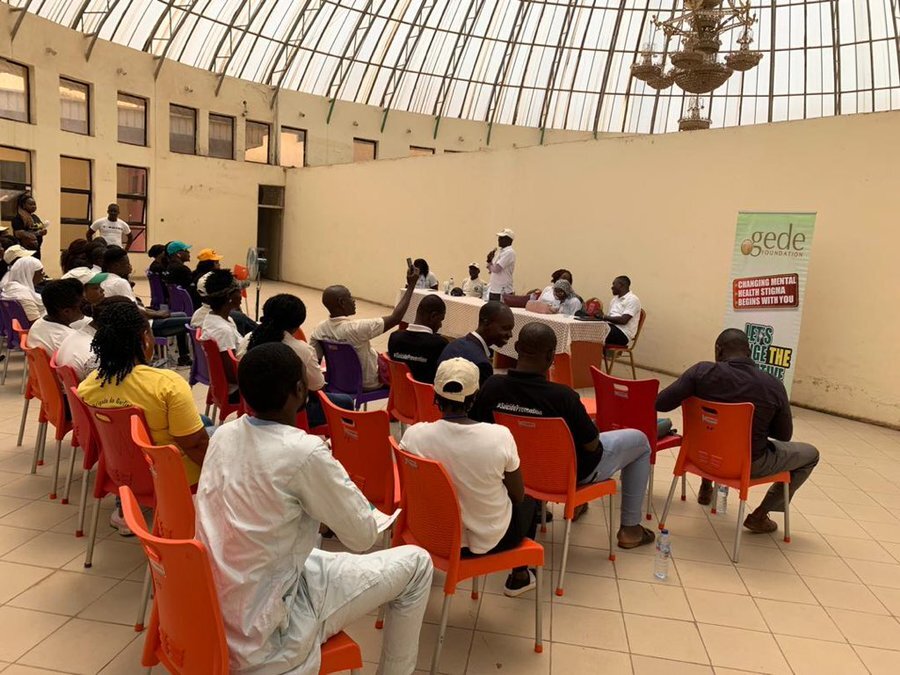“I wish they knew that sometimes; people end their lives out of frustration. I wish they knew that
even though everyone has it rough, people don’t have the same level of resilience,” Shola Ajayi.
This year’s World Health Mental Day coming up on October 10 will focus on suicide prevention. The “40 seconds of action’ is meant to bring attention to the increased suicide rates around the world and how we can help to prevent it. According to the World Health Organisation (WHO) ‘close to 800 000 people die due to suicide every year, which is one person every 40 seconds.[1] WHO statistics show that “suicide occurs throughout the lifespan and is the second leading cause of death among 15-29-year olds globally.”[2]
Suicide: The looming Health Crisis in 2020
In Nigeria, the WHO reports that there are 17.5 suicide deaths for 100,000 population.[3] As the founder of a Foundation that works in mental health, the increasing rates of suicide particularly among the youth population is seemingly alarming. Several such incidences of suicide are reported daily:[4]
On 25 March 2019, the Guardian Newspaper[5] had a picture of an SUV on Third Mainland Bridge, Lagos. That car belonged to a Dr. Allwell Orji who had parked and jumped into the lagoon. He died.
A 500-level Urban and Regional Planning undergraduate of Ladoke Akintola University of Technology (LAUTECH), Ogbomosho, Adesoji Adediran, took his own life inside his hostel room.
In January 2019, a 19-year-old student of Babcock University in Ilishan-Remo, Ogun State, Verishima Unokyur, committed suicide in his parents’ home in Mafoluku area of Oshodi, Lagos.
A manager with a commercial bank, Olisa Nwokobi, shot himself in Lagos due to pressures from a loan repayment debt.
There is a general consensus among psychiatrists, psychologists, and mental health workers that the suicide rates in Nigeria is posing a serious problem to public health system; yet, “suicides are
preventable with timely, evidence-based and often low-cost interventions.’’[6]
Suicide Remains a Criminal offence in Nigeria
In Nigeria, the law punishes persons who attempt suicide. Those who have attempted suicide and failed rather than getting help have found themselves under the long arm of the law. The CNN reported the case of Ifeanyi Ugokwe, who attempted to take his own life and failed.[7] He was arrested and detained. There are several such reported arrests of suicide survivors. Suicide is criminalised under the Criminal Codes. Under Section 327 of the Criminal Code Act, attempting to kill yourself carries a penalty of up to one year in prison (that is where you do not succeed). According to the Code “Any person who attempts to kill himself is guilty of a misdemeanour and is liable to imprisonment for one year.” The law is a holdover from when Nigeria was a British
Colony under the Suicide Act of 1961, which has since been abolished in Britain.
What is to be Done
The focus on Suicide on this years’ World Mental Health Day could not have come at a better time. Nigeria needs an urgent focus on suicide prevention. To do that, we need a comprehensive Mental Health Action Plan and legislation. We need to focus attention on prevention strategies: on stigma and taboo, effective support to survivors and establishment of ‘help lines’ within a coordinated national response. Nonetheless, for ‘national responses to be effective, a comprehensive multi- sectoral suicide prevention strategy’[8] must be put in place and the antiquated holder over law on suicide stricken from the books.
The work of Gede Foundation in Mental Health
Gede Foundation was established in 2003 in Nigeria to bring underserved and stigmatized health and social burdens out of the shadows. Its core competence is rooted on organizational learning and advocacy through action (community intervention) research. The Foundation’s team, through the years, has initiated discussions and work in the areas of HIV/AIDS and Mental Health – both are highly stigmatized health conditions, especially, mental health in low- and middle- income countries.
Gede’s work in mental health began in 2015 with a prevalence study on depression, alcohol use, and suicidality among people living with HIV-AIDS in Nigeria.[9] In partnership with Basic- Needs UK, Institute of Human Virology in Nigeria and Catholic Relief Services, the Foundation carried out these projects i) Community Mental Health and Development Programme, ii) Mental Health and Psychosocial Support (MHPSS) needs assessment among internally displaced persons, and, iii) Adaptation and validation of mental health screening tools for use among orphans and vulnerable children in Nigeria.
Currently, the Foundation is partnering with Christian Blind Mission (CBM) and Time to Change Global (TTCG) to lead an anti-stigma campaign for mental health in Nigeria. The campaign is aimed at improving public attitudes and behaviours towards people with mental health problems through social contact events, driven by people with lived experience of mental health problems.
























